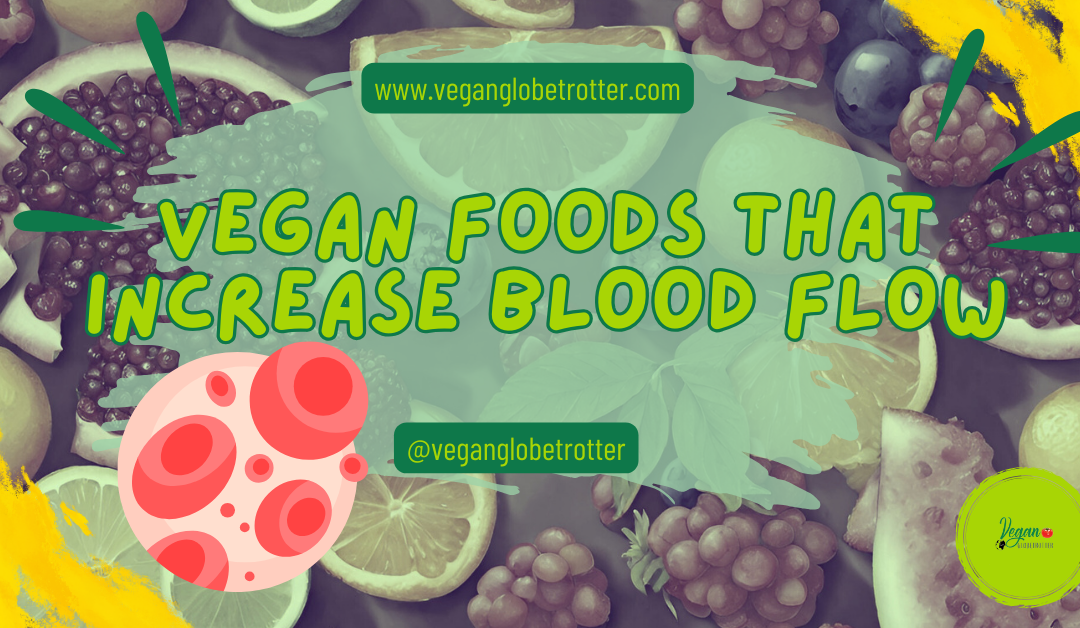Vegan Globetrotter is supported by our audience. When you purchase through one of our links, we may earn a small affiliate commission. As an Amazon Associate I earn from qualifying purchases. Your cost is not affected.
==================
Optimal blood flow is essential for maintaining cardiovascular health and overall well-being. A vegan diet, rich in specific nutrients, can significantly enhance circulation. This is attributed to the fact that many plant-based foods contain compounds that promote vasodilation and reduce inflammation, which are beneficial for blood flow. Research indicates that vegan foods support arterial health, lower blood pressure, and improve heart function.

Choosing the right vegan foods is key to reaping these benefits. Beets, for instance, are high in nitrates that the body converts into nitric oxide. This molecule relaxes and widens blood vessels, while foods like leafy greens and turmeric contain antioxidants that protect the vascular system.
As interest in plant-based diets grows, understanding which vegan foods contribute to blood circulation is becoming increasingly important for those looking to enhance their cardiovascular health without relying on animal products.
Key Takeaways
- Plant-based foods can enhance blood circulation and support cardiovascular health.
- Certain vegan foods contain nitrates and antioxidants that are beneficial for blood flow.
- A vegan diet that includes a variety of nutrient-rich foods promotes overall vascular health.

Benefits of Vegan Foods for Blood Flow
A vegan diet can significantly benefit cardiovascular health, particularly in enhancing blood flow. Plant-based foods often have high levels of certain nutrients that promote vasodilation, which is the widening of blood vessels that aid in improved circulation.
Cayenne pepper is a notable example, as it contains capsaicin, a compound that encourages blood flow by reducing blood pressure and stimulating the release of vasodilators. A study on identical twins has shown that vegan diets contribute to better cardiovascular health markers than omnivorous diets.
Furthermore, vegan diets rich in antioxidants and phytochemicals have reduced inflammation, vital in maintaining healthy blood vessels and promoting circulation. Diets that limit animal products, embracing plant-based options instead, have been linked with reversing coronary atherosclerosis, thus increasing blood flow and reducing the risk of coronary events. A study supports enhancing cardiovascular safety and performance linked to plant-based diets here.
Including various vegan foods such as Ginkgo Biloba and watermelon, known for boosting circulation, is suggested. Specifically, watermelon contains lycopene, an antioxidant that can help improve blood flow.
Key Nutrients in Vegan Foods That Promote Circulation
The vegan diet includes foods rich in nutrients that support and improve blood circulation. Consumers can obtain essential vitamins and minerals that help maintain a healthy cardiovascular system by focusing on key plant-based ingredients.

Nitrate-Rich Vegetables
Nitrate, converted into nitric oxide in the body, is pivotal in vasodilation and, thus, blood flow. Leafy greens such as spinach, kale, and arugula are high in nitrates. Beets also offer a potent source of this nutrient, helping to enhance circulation and lower blood pressure.
Potassium-Heavy Fruits
Potassium is a critical mineral that assists in muscle function and promotes vasodilation. Fruits like bananas, avocados, and oranges are packed with potassium, aiding in optimal blood flow and reducing the risk of cardiovascular issues.
Essential Fatty Acids from Nuts and Seeds
Omega-3 and Omega-6 fatty acids are vital for heart health, and vegan sources like flaxseeds, walnuts, and chia seeds provide a rich supply. These essential fatty acids help to reduce inflammation, thereby improving circulation.
Antioxidant-Loaded Berries
Berries such as strawberries, blueberries, and blackberries offer abundant antioxidants which protect blood vessels from damage. The high antioxidant content promotes blood flow by preventing arterial build-up and enhancing overall vascular function.
Iron-Abundant Legumes
Legumes like lentils, chickpeas, and beans are a crucial component of a vegan diet, providing a good source of iron. Adequate iron levels are essential for hemoglobin function and oxygen transport in the blood, which is indispensable for circulation.

Best Vegan Foods for Enhanced Blood Flow
Optimal circulation is fundamental for overall health. Certain vegan foods can help enhance blood flow. These foods are rich in nutrients that boost circulation and promote cardiovascular health.
Leafy Greens
Leafy greens like spinach and kale are high in nitrates, which the body converts into nitric oxide. Nitric oxide helps to relax the blood vessels, improving blood flow and lowering blood pressure.
Beetroot
Beetroot is another excellent source of nitrates, making it a powerful food for increasing blood flow. Studies have suggested that beetroot can improve circulation and aerobic performance due to its effects on blood vessel dilation.
Berries
Berries such as strawberries, blueberries, and raspberries are rich in antioxidants, including vitamin C and flavonoids. These compounds help protect the blood vessels from damage and support circulatory health.
Citrus Fruits
Citrus fruits, including oranges and lemons, contain high vitamin C and flavonoids. These nutrients assist in strengthening capillary walls and improving blood flow, while also reducing inflammation.
Walnuts and Seeds
Walnuts, flaxseeds, and chia seeds are high in alpha-linolenic acid, an essential omega-3 fatty acid. Omega-3s are known to reduce blood vessel inflammation and improve circulation.
How Vegan Diet Supports Cardiovascular Health
A vegan diet can benefit cardiovascular health due to its focus on plant-based foods, often high in essential nutrients and low in saturated fats. The key components of vegan diets, such as whole grains, nuts, fruits, and vegetables, are known for improving blood flow and reducing the risk of heart disease.

Nutrient-Rich Foods
Vegan diets are rich in:
- Fiber: Found in beans, oats, and whole grains, it helps to reduce cholesterol levels in the blood.
- Potassium: Abundant in bananas and spinach, it aids vasodilation and controls blood pressure.
- Antioxidants: Plentiful in berries and dark leafy greens, they mitigate oxidative stress on the cardiovascular system.
Reduced Saturated Fat Intake
Animal products are major sources of saturated fats, which can contribute to plaque buildup in the arteries. In contrast, a vegan diet naturally reduces these fats, helping to maintain clearer arteries.
Plant-Based Protein
Legumes and lentils provide protein without the saturated fat in many animal products, contributing to better endothelial function.
Research highlights the cardiovascular benefits of plant-based diets, including the potential for reversing coronary atherosclerosis, which can lead to improved blood flow and a reduced risk of coronary events.
By including various plant-based foods, individuals following a vegan diet support their body’s regulation of blood pressure and inflammatory processes, important factors for cardiovascular health.
Meal Planning for Optimal Blood Flow
Proper meal planning can enhance circulatory health by incorporating plant-based foods that support blood flow. This can be particularly beneficial for vegans seeking heart-healthy nutrients.
Daily Meal Guide
Breakfast: Start the day with a bowl of oatmeal topped with berries and flaxseeds, known for their positive effects on circulation due to their high antioxidant and omega-3 content. A glass of freshly squeezed orange juice provides vitamin C which strengthens capillary walls.
Lunch: A spinach salad sprinkled with walnuts and slices of avocado combines rich sources of nitrates and healthy fats to promote blood vessel dilation and lower blood pressure.
Dinner: End the day with a dish centered around beets, such as roast beetroot. Beets are high in nitrates, which convert into nitric oxide, a compound that helps blood vessels relax and expand, improving blood flow.
Snacks: Snack on pomegranate seeds or dark chocolate (at least 70% cocoa) throughout the day. Both are not only delicious but are also linked to increased circulation, as noted by Healthline.
Recipes for Circulation
Garlic-Ginger Stir-fry: Incorporate garlic and ginger into your stir-fries. Research highlights the role of garlic in cardiovascular health due to its blood-thinning properties, while ginger is known for its ability to improve blood flow and prevent blood clots.
Turmeric Lentil Soup: A warm bowl of lentil soup seasoned with turmeric can be particularly heart-healthy. Turmeric contains curcumin, which has anti-inflammatory and blood vessel-supporting effects. Add a pinch of black pepper to enhance curcumin absorption.
Lifestyle Considerations for Improved Circulation
Adopting a vegan diet can contribute significantly to improved blood flow and circulation. Key dietary changes focus on consuming plant-based foods known for their cardiovascular benefits.
- Fruits and Vegetables: A high intake of fruits and vegetables, which are brimming with antioxidants, can aid in combatting inflammation, thus improving circulation. Leafy greens like spinach are rich in nitrates, which the body can convert to nitric oxide, a molecule that helps dilate blood vessels and enhance blood flow.
- Whole Grains: They should opt for whole grains over refined grains to maintain good circulation, as whole grains have been found to help regulate blood pressure and improve overall heart health.
- Nuts and Seeds: Regularly incorporating nuts and seeds, which are high in vitamin E, can prevent plaque buildup in the arteries, allowing for better blood flow. Evidence suggests diets that include a variety of nuts and seeds can be a potent ally for cardiovascular health.
Physical activity is another pillar for promoting good circulation. Individuals should exercise regularly, which is one of the most effective ways to stimulate blood flow, lower blood pressure, and improve heart health.
Moreover, individuals should maintain a healthy weight, avoid smoking, and manage stress, as these factors can negatively impact blood flow and cardiovascular health. Implementing stress-reduction techniques such as meditation, yoga, or deep breathing exercises can have favorable effects on blood vessel function and circulation.
These lifestyle choices and a plant-based diet can considerably improve one’s circulatory system, reflecting positively on cardiovascular health.
Research on Vegan Diet for Blood Flow
Recent studies have shown the potential for a vegan diet to improve cardiovascular health. Specifically, researchers at Stanford Medicine conducted a study with 22 pairs of identical twins and found that a vegan diet can improve cardiovascular health in as little as eight weeks. This highlights the diet’s potential to increase blood flow and reduce the risk of cardiovascular disease.

Scientific research also indicates that vegan diets may favorably affect blood pressure and cholesterol levels—both critical factors in blood flow and heart health. For instance, a systematic review of the literature found that vegan diets were associated with lower body mass index (BMI), serum cholesterol, and blood pressure, suggesting a link between such diets and improved blood flow.
Furthermore, vegan diets are typically rich in certain nutrients like nitrates from leafy greens, which the body converts into nitric oxide. This molecule helps dilate blood vessels and enhances blood flow. These diets also tend to be high in antioxidants and other phytochemicals that can improve endothelial function and blood flow.
Below is a summary of the key findings:
- Improvements: Enhanced blood flow and cardiovascular health
- Duration: As little as eight weeks
- Markers: Reduced BMI, cholesterol, and blood pressure
The evidence suggests that adopting a vegan lifestyle might not just be beneficial for animals and the environment but could also play a significant role in maintaining a healthy cardiovascular system and promoting good blood flow.
Challenges and Considerations
Adopting a vegan diet to enhance blood flow presents several challenges and considerations that individuals must be aware of. One primary concern is ensuring a sufficient intake of nutrients less abundant in plant-based foods.
Nutrient Absorption and Deficiency Risks
- Iron: Plant sources of iron (non-heme iron) are not as easily absorbed by the body. Individuals should consume vitamin C-rich foods to enhance iron absorption.
- Omega-3 Fatty Acids: Essential fatty acids, particularly EPA and DHA, are mostly found in fish. Vegans can opt for algae-based supplements or flaxseeds and walnuts for ALA, which the body partially converts to EPA and DHA.
- Vitamin B12: Critical for blood formation and neurological function, vitamin B12 is naturally found in significant amounts only in animal products. Vegans should consider fortified foods or supplements.
Plant-based Food Bioactive Compounds
- Nitrates: Certain vegetables high in nitrates, such as beets and leafy greens, can support blood flow. However, one should moderate intake to avoid potential issues with high nitrate levels.
- Flavonoids: Found in fruits like berries and citrus, flavonoids can improve cardiovascular health. Yet, individuals with fruit sensitivities should approach cautiously to avoid allergic reactions.
Diet Variation and Planning
- A varied diet is crucial to cover all nutritional bases. Plan meals to include a range of vegetables, fruits, whole grains, nuts, and seeds.
Potential Medicinal Interactions:
- Some vegan foods may interact with medications. Those taking blood thinners should be wary of foods like cranberries or grapefruit that might amplify the effects of their medication.
Individuals should consult a healthcare provider to tailor a vegan diet that meets all their nutritional needs while promoting improved blood flow.
Wrapping It Up
Prebiotics play a vital role in gut health. They feed good bacteria, aiding digestion and well-being. Include foods like bananas, garlic, and onions in your diet.

Adopting a plant-based diet has notable implications for cardiovascular health, particularly concerning blood flow. Legumes, nuts, fruits, and vegetables have all been recognized for their beneficial properties. Foods like cayenne pepper, known for the compound capsaicin, are particularly effective in enhancing circulation by lowering blood pressure and promoting blood flow to tissues.
In contrast to diets heavy on animal products, a vegan diet limits such foods and focuses on plant-derived nutrients. This dietary approach can aid in blood glucose control, improve plasma lipid concentrations, and, alongside a healthy lifestyle, may even reverse atherosclerosis.
The importance of nutrition on cardiovascular health thus cannot be understated. Individuals seeking to support their circulatory system could consider incorporating plant-based foods, which provide a variety of vitamins, minerals, and antioxidants. While individual dietary needs and responses vary, the general consensus aligns with the positive impact of vegan dietary choices on blood flow and cardiovascular health.
FAQs
What are the top plant-based foods known to improve heart health and circulation?
Certain plant-based foods are particularly good for heart health and circulation. Foods like pomegranates provide nitric oxide, which can enhance blood flow, while beets are high in nitrates that convert to nitric oxide. Leafy greens also contribute to vascular health through their high levels of nitrates.
Can certain vegan foods promote better circulation in the legs?
Yes, foods rich in antioxidants and vitamins can help improve circulation in the legs. For example, citrus fruits like oranges deliver vitamin C, which strengthens capillary walls and may boost leg circulation.
What vegan diet options can enhance liver blood flow?
Vegan foods that may aid in increasing liver blood flow include garlic and turmeric, both known for their anti-inflammatory properties. Turmeric, specifically, may increase nitric oxide production, improving circulation to the liver.
Are there any specific foods that can naturally increase blood pressure for vegans?
Naturally salty foods such as olives and sea vegetables might gently raise blood pressure for those who might need it. These should be consumed in moderation, and it’s best to consult a healthcare provider before making dietary changes for blood pressure issues.
Which vegan foods have been shown to aid in increasing circulation to the brain?
Foods such as walnuts and flaxseeds are high in omega-3 fatty acids, which are beneficial for brain health and may improve cerebral blood flow. Dark chocolate, in moderation, is another option as it’s high in flavanols that can boost blood flow to the brain.
Learn Vegan Cooking With Us!
Discover the various vegan dishes with Vegan Globetrotter. Learn aromatic and appetizing vegan dishes that blend flavor, health, and simplicity. Stay connected and enhance your vegan cooking skills:
- Facebook: Vegan Globetrotter
- Instagram: @_veganglobetrotter
- Pinterest: The Vegan Globetrotter
- Twitter: @VeganGlobetrot
Join our community and explore the wonders of vegan cooking! For more insights into the world of vegan cooking, visit our website: veganglobetrotter.com



Don't miss out
when new recipes and information are added!
Join our newsletter for free recipes,
healthy living inspiration, and special offers
You have Successfully Subscribed!